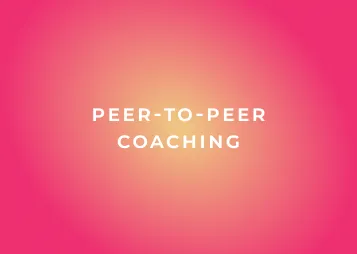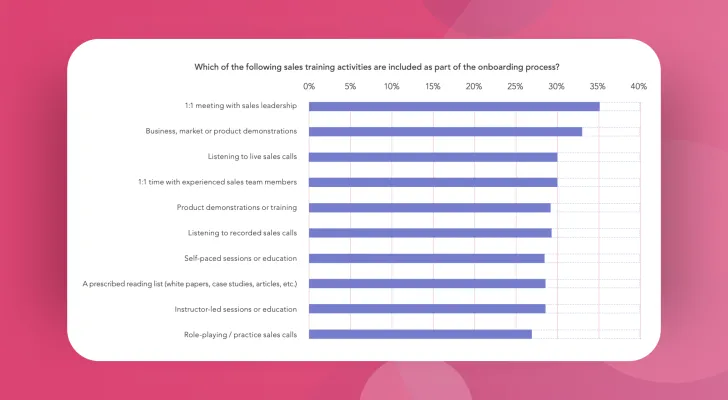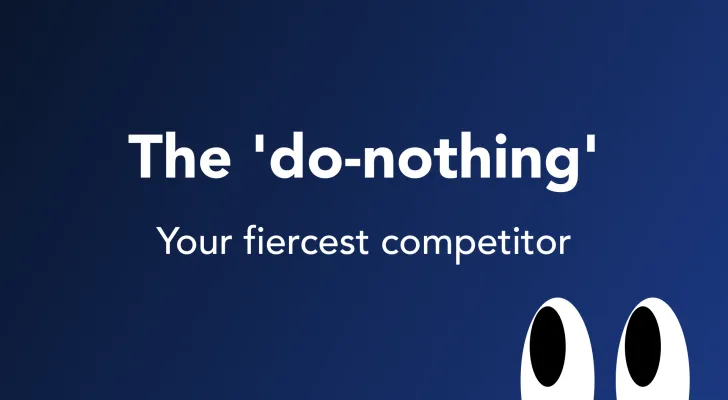If you’re a busy Sales Manager with reps to develop and a never-ending to-do list - peer-to-peer coaching is the ultimate time-saver.
What is peer-to-peer coaching?
Peer-to-peer coaching is a collaborative approach to sales coaching where sales reps support each other’s development through shared insights, feedback, and guidance. This method leverages the collective experience and knowledge of your team, fostering a culture of continuous learning and improvement. It plays a vital role in creating an environment where reps can learn from one another, gain diverse perspectives, and build stronger skills together.
Complementing traditional coaching methods by promoting accountability, and boosting morale, it enables reps to take ownership of their growth.
Sales coaching in any form should be centred on the rep’s goals to improve performance. It's about the person, not the player - so encourage the individuality and personality of the person receiving the coaching.
Training vs feedback vs coaching
Understanding the distinction between training, feedback, and coaching is essential for driving success. These elements complement each other and, when used appropriately, can significantly enhance a sales team’s performance. Offering individuals in your team the right one at the right time, will produce the best outcome.
- Training: Provides foundational knowledge and understanding, critical during onboarding.
- Feedback: Builds on that foundation by enhancing skills through constructive evaluation.
- Coaching: Goes beyond feedback, focusing on continuous improvement and performance evaluation.Only once you have trained and had feedback can you move into coaching, evaluating performance by recognizing what you do well and what requires improvement.
Coaching as movement
Coaching should be seen as inspiring and creating movement from A (present situation or state) to B (desired situation or state). It’s about the journey and what happens along the way, not about smashing a goal as quickly as possible.
This is why peer-to-peer coaching sessions should be broken down into three key parts:
- Introduction (introducing the call picked to coach and why it was picked)
- Explore (which unpacks what happened in the call)
- The Path (which surfaces the route the rep can take to improve and progress towards their desired state)
Ownership in coaching
One crucial consideration for managers implementing coaching in any form is encouraging accountability and ownership. We want the coachee to feel ownership and have passion for their development.
There is nothing more powerful than our own ideas because with our own ideas we feel in control. Ownership can be developed within the team through two simple steps:
- Decision making - There is so much outside of a rep’s control every single day, so give them ownership by offering them the chance to make decisions. What are their goals? What do they want to improve on? And in what time frame?
- Self-investment - This means having time allocated so that coaching becomes important due to the time committed and investment of resources. Whether it's self-coaching, peer-to-peer or manager-led, coaching should be quality over quantity so whatever time you have to allocate to coaching, protect it and make sure it happens.
When reps feel ownership, two things happen:
- They feel more self-motivated
- They become far more attached to the outcome.
Both are outcomes we want here!
Peer-to-peer coaching and problem-solving
Negativity can quickly spread through a team, so it's vital to foster a culture of collaborative problem-solving. Encourage open discussion of challenges and create an environment where coaching happens daily, both in big and small ways.
How to set your team up to peer-to-peer coach
Step 1:
First make sure coaching time is diarized and protected in everyone’s calendars. Especially if they are peer-to-peer coaching and you as a manager don't even need to be present, see if this can be diarized for when the rep will be most open and responsive to it. Make sure reps understand how important coaching time is so they don't book any other meetings or calls over peer-to-peer coaching time. Like any change, communication is key.
Step 2:
Think about which peers should be paired up. Perhaps you want to pair top-performers with those not doing so well, or more and less experienced individuals. Equally, reps working in different geographies or selling different product categories might be worth pairing, so they can share insights they may not have access to everyday. Consider what information you want the team to share between themselves to inform your pairings and know that it is good to rotate pairings regularly too.
Step 3:
Next your team needs structure, that should come in the form of a framework or methodology against which they can measure and review their performance. Whatever your methodology or script is, make sure it is easy for reps to refer back to in their peer-to-peer coaching either through implementing it in your conversation intelligence tool or with easy-to-access reference points.
Step 4:
Prep the reps ahead of time. All of your work goes to waste if the reps aren’t invested and prepared ahead of the session so take time to communicate this well. Here is the information they need:
- The plan and aims of the session.
- How much time they have to complete each session and who they are paired with.
- The fact that they need to arrive at the session prepared with a call they would like to review.
- The framework against which they should review the call and structure their coaching time (Introduction, Explore, Pathway - as mentioned above). Reps should aim at the very least in every session to identify ‘What went well’ and a ‘Gamechanger’ that they can improve on for next time.
Prompt questions for peer-to-peer coaching
Coaching can feel daunting when it’s not led by a manager, so arm your reps with these prompt questions to get the coaching session started and conversation flowing:
Explore phase questions
- How would you describe what happened in this call?
- How do you think the customer was feeling at this moment?
- What would better look like?
- Does anyone else in the team do this well? And what could you learn from them?
- How big is the gap between where you are now and where you want to be?
- What have you tried already to improve in this area?
- What progress have you made so far?
- Is there anything in the way of you reaching your goal?
Pathway phase questions
- What do you need?
- Who else might help?
- What is the best next step?
- What can you commit to?
- How can I help you?
- When would you like to reach your next goal?
Bonus tips for coaching with Jiminny
Jiminny was built with sales coaching as a priority, so here are our top tips for using Jiminny in peer-to-peer sales coaching sessions:
- Create a Playlist for reps to share their call recordings in so they are easily accessible for anyone involved. This also allows you and your reps to review the call ahead of the session and leave any relevant comments or notes on the call playback.
- Use the speed enhancer to listen back more quickly. You don't need to spend hours prepping for a coaching session when you can listen back faster.
- Review how the rep performed against the inbuilt framework and how the call was scored against your unique criteria with Automated Call Scoring
Shelley Lavery is the CRO and Co-Founder of Jiminny, the leading conversation intelligence and sales coaching platform that helps companies maximize their revenue. With over a decade of experience in coaching B2B sales teams, Shelley was previously Group SVP of Sales at Reward Gateway now leading the conversation intelligence discussion with expertise and insight.





.webp)






